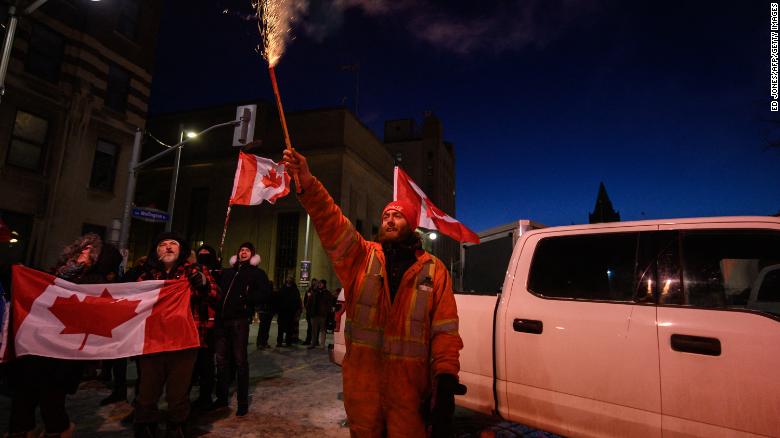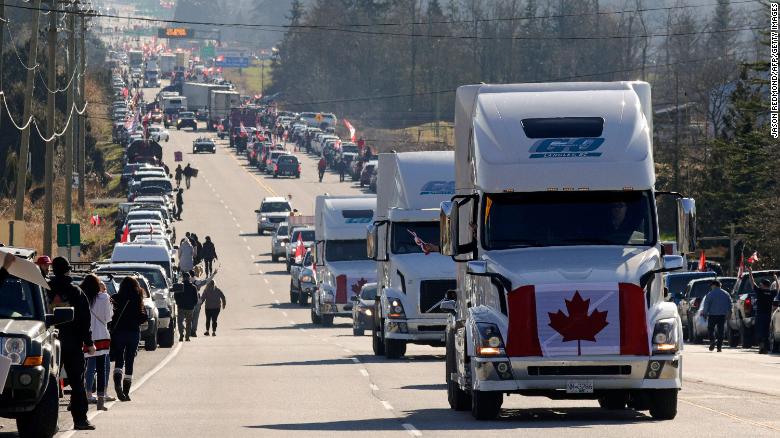A crackdown to expel protesters denouncing Covid-19 mandates could soon restore normalcy to American and Canadian businesses affected by the standoff.
Windsor police have begun arresting protesters who blocked the Ambassador Bridge linking the United States and Canada, a standoff that has clogged traffic and brought a key trade route to a standstill for both countries.
“Enforcement actions continue in demonstration area with arrests,” Windsor Police tweeted Sunday morning. “Vehicles towed. Continue to avoid the area.”

The Ambassador Bridge, which spans the border between Detroit and Windsor, Ontario, is the busiest border crossing in North America.
Nearly a week after protesters began blocking the bridge, the mayor of Windsor said the ordeal is ending.
“Today, our national economic crisis on the Ambassador Bridge came to an end,” Mayor Drew Dilkens said in a written statement Sunday.
“Border crossings will reopen when it is safe to do so and I leave it to the police and border agencies to make that determination.”
A judge ordered the protesters to leave the Ambassador Bridge at 7 p.m. Friday, and some protesters walked away on their own as police approached Saturday morning.
But some pedestrians stood near an intersection on a road leading to the bridge later Saturday, including some talking or yelling at a line of standing police officers. Others sang the Canadian national anthem or shouted “Freedom!”
But Canada-bound traffic on the bridge was still suspended early Sunday, according to the Canadian website that tracks traffic at border crossings. Transit to the United States was open, according to the US Customs and Border Protection website .
The protests were sparked by truckers who oppose Canada’s new rule requiring them to be fully vaccinated when crossing the Canada-US border or face a two-week isolation.
Since then, his “Freedom Convoy” has attracted supporters resisting other Covid-19 prevention measures, including mask mandates, lockdowns and restrictions on gatherings.
And for two weeks, they have blocked the center of the city of Ottawa, Canada’s capital, including its main airport, prompting a judge to rule that they must stop honking.
Canada has one of the highest vaccination rates in the world, with about 4 in 5 Canadians fully vaccinated, according to data from Johns Hopkins University. And nearly 90% of the country’s truck drivers are fully vaccinated and eligible to cross the border, according to the Canadian government.
Still, protesters spoke out and used their truck horns to voice their opposition, prompting a judge in Ottawa to rule Monday that they must stop honking for 10 days.
Protesters also used semi trucks, and sometimes farm equipment and other vehicles, to block the crossings between Emerson, Manitoba, and Pembina, North Dakota, as well as at the Coutts access point between Alberta and Montana.
And about 50 vehicles have blocked access to the US-Canadian border at Emerson since Thursday, Manitoba’s Royal Canadian Mounted Police said Saturday.
The blockade has alarmed political leaders, including in the United States.
“We are in an economic crisis because of this illegal lockdown,” which is becoming a national security issue, Michigan Governor Gretchen Whitmer told on Friday.
Canadian officials discuss additional response
Canadian Prime Minister Justin Trudeau and other government officials were briefed on the police action in Windsor on Saturday, according to a statement from his office.
“The prime minister emphasized that border crossings cannot and will not remain closed, and all options remain on the table,” according to the statement.
The ministers also discussed “other immediate actions that the federal government is considering” and will meet again on Sunday.
In addition, the statement says that the Ontario Provincial Police, the Royal Canadian Mounted Police and the Ottawa Police Service have established an Integrated Command Center (ICC) to address escalating tensions in Ottawa, where More than 4,000 protesters were present throughout Saturday, police said in a news release.
“Security concerns, stemming from aggressive and illegal behavior by many protesters, limited police capabilities,” the Ottawa Police Service said. “We hope that the ICC will result in a significantly improved ability of our police service to respond to the current situation in our city.”
Ottawa Mayor Jim Watson told that he expected even more protests as the weekend progresses.
“It’s completely unacceptable,” Watson said. “Particularly in the neighborhoods where some of the protesters go to restaurants and refuse to wear a mask and harass staff and are really belligerent with our city residents.”
Officials in the US ‘ready’ if similar protests break out
Meanwhile, in the United States, officials are preparing to face similar protests, including one possibly affecting the Super Bowl in Southern California this Sunday.
“The convoy will potentially start in California in mid-February and arrive in Washington in mid-March, which could affect Super Bowl LVI scheduled for February 13 and the State of the Union address scheduled for March 1,” said a bulletin from the Department of Homeland Security.
Also, a group in the United States said it is organizing two truck convoys heading to the US-Canada border in Buffalo, New York, this weekend.
However, the city said Friday that no groups had applied for permits to hold events.
“Organizers have also failed to contact our Office of Special Events to arrange for the proper insurance and public safety planning that is required for all events in the city to ensure the health and safety of residents and visitors.” Buffalo city spokesman Michael DeGeorge told. “It’s always a concern when laws that are designed to keep people and property protected are deliberately ignored.”
“We’re ready for these trucks,” Buffalo Mayor Byron Brown said Saturday, “but our goal is to keep our roadways open and make sure residents and visitors are safe and healthy.”

